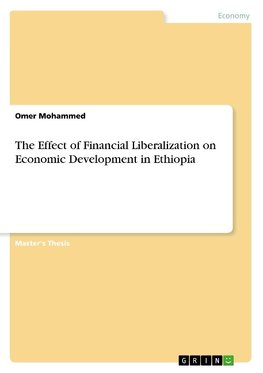
-
 Anglický jazyk
Anglický jazyk
The Effect of Financial Liberalization on Economic Development in Ethiopia
Autor: Omer Mohammed
Master's Thesis from the year 2016 in the subject Economics - Finance, grade: 2, Addis Ababa University (College of Bussiness and Economics), course: Accounting and Finance, language: English, abstract: This study aims to empirically examine the impact of... Viac o knihe
Na objednávku
49.05 €
bežná cena: 54.50 €
O knihe
Master's Thesis from the year 2016 in the subject Economics - Finance, grade: 2, Addis Ababa University (College of Bussiness and Economics), course: Accounting and Finance, language: English, abstract: This study aims to empirically examine the impact of financial liberalization on economic development in Ethiopia over the period of 1984-2014. In doing so, the ARDL approach to Co-integration and Error Correction Model were employed to investigate the long run and short run relationships.
Accordingly, the empirical results obtained from the study indicate that financial widening has contributed significantly to the increase in saving and the level of economic growth. Even though, the total deposit happens to generate more investment; there is shortage of supply of credit. In addition, the study indicates financial widening and credit to the private sector exhibited a significant positive association with financial development while total banks credit bearing a significant impact on industrial development.
However, the overall financial reform showed insignificant association both with economic growth and industrial development. The efficiency in allocating financial resources show significant positive association with share of banks credit to the private sector, however, the overall financial reform has positive insignificant impact on efficiency of resource allocation. The contribution of financial sector after the deregulation has a mixed result on welfare. In terms of catalyzing employment opportunity, financial widening and the overall liberalization policy measure have played a positive role while the financial development has no significant impact on employment creation. Financial widening has significant positive impact on poverty alleviation while the overall policy measure has insignificant impact on the impoverished.
Consequently, the result of the study indicate the overall financial liberalization measure actually decrease the likelihood of financial instability and indicates the direction of causality going from economic growth to financial development proving the demand leading hypothesis, which in turn portrays the heavy involvement of government in the financial sector.
- Vydavateľstvo: GRIN Verlag
- Rok vydania: 2017
- Formát: Paperback
- Rozmer: 210 x 148 mm
- Jazyk: Anglický jazyk
- ISBN: 9783668546790












